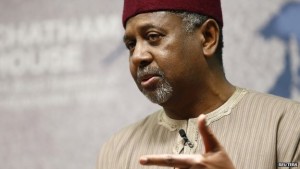Nigeria’s Election Day Approaches: A Plea for Postponement
 With the 2015 presidential elections scheduled for February 14, barely a month away, Nigeria is entering a relatively contentious and stressful period as politicians on the local and national level prepare for what the future holds. Surely, the date of this highly anticipated election has been known for over a year; but Sambo Dasuki, the National Security Adviser to President Goodluck, has issued a statement to the Independent National Electoral Commission (INEC), pleading with them to postpone the national elections.
With the 2015 presidential elections scheduled for February 14, barely a month away, Nigeria is entering a relatively contentious and stressful period as politicians on the local and national level prepare for what the future holds. Surely, the date of this highly anticipated election has been known for over a year; but Sambo Dasuki, the National Security Adviser to President Goodluck, has issued a statement to the Independent National Electoral Commission (INEC), pleading with them to postpone the national elections.
Given the heightened violence and turmoil in the country, Dasuki’s plea has been regarded by many as a reasonable one: Elections are most free and fair -- and orderly --when performed in a safe and open environment where citizens feel a sense of protection from their government as they exercise their inalienable right. And promoting this fair and especially safe election should be Nigeria’s priority. However, dismissing this logic, the All Progressives Congress (APC), the main opposition party to the current government, has denounced the National Security Adviser’s plea as a plot by the Goodluck administration to gain more time to rally for additional votes from Nigerians. They believe that, given the current state of Nigeria, Goodluck expects to lose this election and be denied a second term in office.
This plea to postpone the elections shows a sudden confidence in the current government’s ability to protect its citizens; confidence that seems quite unfounded, and has been absent since Boko Haram began operations in northern Nigeria as far back as 2002. Meanwhile, the recent massacres at Maidiguri and Monguno, orchestrated by Boko Haram, can partly be interpreted as a violent indication of the need for an immediate change in this government that has failed the Nigerian populace on many counts: It failed to eliminate the terrorist organization before attaining its current level of sophistication; it failed to recover several of the young girls kidnapped months ago, among other unfortunate examples.
In addition to the increased national security risk posed by Boko Haram, Nigeria has long faced its fair share of issues surrounding its elections and their credibility. The country’s last elections in 2011 were reportedly its least fraudulent in a very long time. Regardless, 800 people were killed after Buhari lost to Jonathan Goodluck. Previous elections were always riddled with illegal practices like ballot box snatching, fabricated results and the intimidation of voters by politically-motivated armed thugs. In anticipation of the upcoming elections, staunch efforts have been made to address these factors and clean up the electoral process, with the exception of the armed thugs now present as Boko Haram. This will likely be one of the main factors preventing people from going out to vote because voters simply do not feel protected against possible politically-charged attacks by Boko Haram.
Despite these recent efforts to clean up Nigeria’s electoral process, the very political conditions that have ushered in dirty elections in the past are still present this year: Presidential races in Nigeria have not been as contentious as this one since the end of military rule in 1999. Unfortunately, a race this contentious -- between current president Goodluck, and former military ruler Mahammadu Buhari -- has historically incited hyper fraudulence. Hopefully, the measures put in place by the Independent National Electoral Commission (INEC) and other electoral committees will ward off such practices. Among the measures taken by INEC this year was the introduction of Biometric IDs, which will enable officials to better identify voters and prevent fraudulent practices like ballot box stuffing. Sambo Dasuki in his plea, indicated that these costly cards have been handed out only to about 30 million Nigerians of the 170 million Nigerian citizens who will need the cards to vote.
It is imperative that all i’s are dotted and t’s are crossed in preparation for the upcoming election, to avoid violence similar to that following the 2011 elections. Today, with the looming presence of Boko Haram, any unfair -- or even, undesired -- results will likely lead to even more deaths and violence than before. Perhaps, Nigerian officials could use the extra time.
